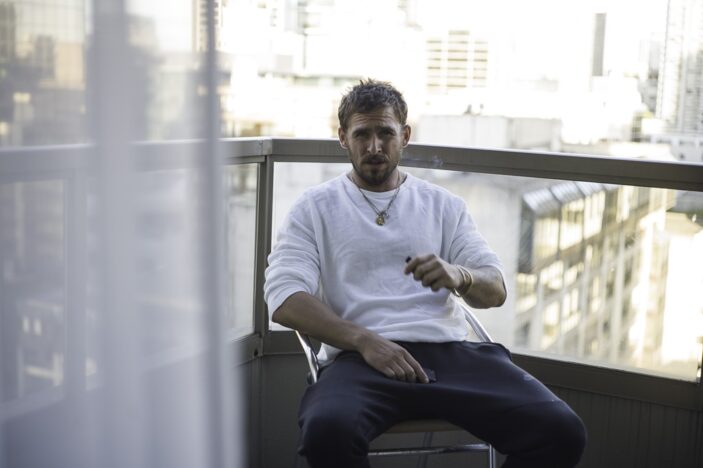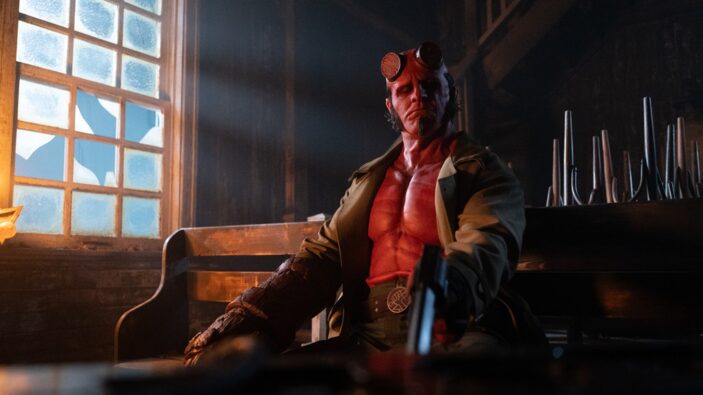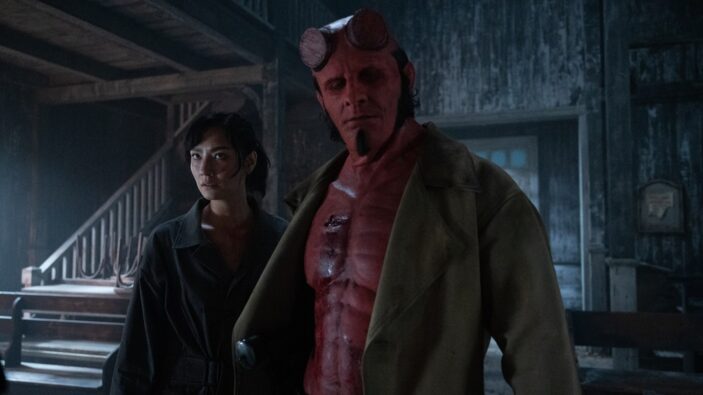
Actor Jack Kesy is no stranger to dabbling in the realms of the action (The Killer), comic book (Deadpool 2) and horror genres (TV’s The Strain) across his career thus far. But what about an amalgamation of all three?
Following in the footsteps of Ron Perlman and David Harbour before him, Kesy is stepping into the signature red skin of the world destroyer that is Hellboy in Hellboy: The Crooked Man, the fourth instalment in the global franchise that sees Hellboy and a rookie agent from the Bureau for Paranormal Research and Defense become stranded in 1950s rural Appalachia, only to discover a small community haunted by witches, led by a sinister local demon known as ‘The Crooked Man’ who has been sent back to earth to collect souls for the devil.
Written by Hellboy’s legendary creator Mike Mignola and directed by Brian Taylor, Hellboy: The Crooked Man is marching into Australian theatres this week, and to coincide, our own Peter Gray spoke with Jack about taking on such an iconic role, how he differentiated his performance from past iterations, and infusing the physicality of the role with a sense of emotion.
I have it on good authority from your director Brian Taylor that what you did in your audition essentially clinched the role for you. I gotta ask, how does a cigarette taste?
Man, I’ve been doing it for years. I can’t even taste it anymore.
When you went in for that audition, was that your game plan?
The whole thing came out of left field. I don’t want to take too long rehashing it, but I was driving through Detroit (and) I got a phone call from a producer that I worked with before. They’re obviously big fans. I’m very grateful. They were like, “Dude, it’s happening. (It’s) moving fast, blah, blah blah. Do you want to do Hellboy?” I was like, “Hold on, let me pull over. What are you talking about? Who, what, where, when why?” They (told me) “Put this on tape. Just do what you got to do. We think you’re the guy anyway.” I ran home, literally did it, and there really wasn’t much to think about. It wasn’t like a premeditated thing, you know? I smoke from time to time, and I just thought, “Well, this guy smokes.” I know Hellboy smokes. I’ve seen the comic books. He got little rollies. I figured this guy’s half human, half demon. I don’t even think he likes to smoke, he just likes to pretend he’s one of the cool kids to fit in. It figured, to him, it’s like potato chips. So, it was just the thing I created. Plus, I couldn’t throw it out on a carpet. You know what I mean?
This is the fourth Hellboy film, and the third iteration of the character we’ve seen on screen. How do you approach this role and stay true to what the fans love about it, but also make it your own at the same time? And not rehash what we’ve seen Ron Perlman and David Harbour do in the past?
That’s a great question. It’s a thought that went through my mind in the early stages. Thankfully, once I stepped into the whole shebang, so to speak, that was created for me. I had no say in, “Well, I want the hair this way. I want the nose that way.” That’s not my job. That was done. So to some extent you follow a blueprint, right? And my job is looking at the script. I look at the dialogue. I’ve been doing this for a little bit, and I got to figure out where I can make this my own.
For example, the smoking. I’ll smoke. I’ll eat some here and there. I kind of could relate to the wisecracking and the jadedness and the sarcasm. It just rolls right off the tongue. I was grateful it was relatable. But all due respect to Ron (Perlman), he nailed it. I mean, it’s a great character, such a specific character that it’s sort of, and this isn’t a cop out, but it’s like Batman. You might be a little skinny or might be a little (bigger) but it’s the same deal, right? That was the fun challenge in making (Hellboy) my own. I was grateful enough where I could improvise a few one liners where they were like, “Holy crap, that was actually really witty.” It’s a collaborative process. They let me have a few cracks at it. And, you know, it’s subtle, right? It’s a subtle form of art. Hopefully people can distinguish and still be happy with it. I mean, it’s up to the fans, right?

You talked about the collaborative process, and I know that (Hellboy creator) Mike Mignola co-wrote this screenplay. Was there any direct input from him? Was there ever a worry of taking on his vision? Or did he let you play?
Honestly, Mike wasn’t on set, but he was working intimately with Brian (Taylor, director) via zoom or FaceTime, or whatever. I approached it the same way I approach any other film. I’m going to go balls to the wall. I’m going to go for things. I just go for it. You don’t like it? You tell me. Rein me in, right? Sometimes they rein me in. Sometimes they let me loose. It’s the way I work. I mean, shit, we finished it, right?
Looking at the physicality of the role. How did you find that to balance with the emotional depth that is required? I feel like Hellboy is one of those characters that has a lot more personality to him than other comic book characters. How did you find that balance?
That’s a great question. Honestly, that’s something I was excited (for) most, you know? I tried to push where we could (to) kind of show that humanness. Get right to the intimacy, to the subtlety. Obviously, that was a bit of a challenge as well, because I know myself as a human being and how I work, but there’s kind of a buffer between you and the lens. It was a little bit of a trust exercise. I wanted to keep it raw and real. I like things grounded (and) hopefully I accomplished that. There’s always going to be people who want more. There’s going to be people who want less. At the end of the day I always say, “It’s not a fucking 60s Ingmar Berman film.” It’s a fun supernatural action film. It’s a tricky balance, right? It’s a balancing act, for sure.
Because this explores different aspects of what we’ve seen prior, do you feel like that narrative helped you in making Hellboy your own?
Yeah, absolutely. And the fact that, right off the bat, me and Brian always saw things differently, but for the most part, fundamentally, I was relieved that he wanted to see this (story) grounded. Quieter, so to speak. I don’t even have the verbiage for it. Just more grounded. In his words, “Not a space opera.” We’re not jumping from moon to moon, world to world, big monsters. At the end of the day, Hellboy is a horror film. He’s a half-demon, half-human fighting dark creatures. It’s a horror film, and we tried to keep it grounded. Keep it relatable.
So many comic movies play it safe, so it’s nice that this Hellboy was like, “Nah, we’re just going to do what the character deserves.” But with that, do you feel any pressure in terms of the fans watching? Or do you just have to know it’s out of your hands.
Look, I would be lying if I said, “Ah, there’s no pressure.” There’s always an element of wanting the validation of the people that really want to see it. But I’m able to push that aside, because at the end of the day it’s a team effort. It’s the prosthetics guys, the director, the editor, it’s everybody, right? We take the win and we take the fall. And I know I’m giving it my all. I have fucking broken my back out there. I worked through all kinds of sickness. I was hard as shit on it. I gave it all I got, and, you know, I hope (the fans) like it. If they don’t? What am I gonna do?

As you mentioned working with Brian, and I was looking at the other directors you have worked with, and you have a great filmography behind you. Was there a director that you worked with that gave you the best advice? Or helped you improve as an actor?
You know what? Man, you got me on the spot. I’d have to really go back. I have had the privilege of working on many different films. Big blockbusters where it’s strictly business. Get in, get out, shut up, move on. But I prefer the smaller, independent films where people are really trying to make a mark. I learned a lot from smaller filmmakers. I remember working on a film with an Australian guy, who I’m still friends with, Daniel DeMarco, on a tiny film. He told me to do less. I always thought I did absolutely nothing, and he was like, “You could do even less.” That really gave me a lot to think about. It’s a very hard thing to do less. You want to do more. You want people to see and hear what you’re doing.
And you’ve worked with special effects before. Would you say this film is the one that you’ve interacted with the most regarding that technology? Does it get any easier?
That stuff is easy, man. Honestly, as an actor I’m kind of a hybrid. A little bit method and a lot of imagination. Sometimes I don’t even need the actor in the room. I’m better off on my own. I’m like a kid at play with a cardboard box, right? I don’t need the toy. Just give me the box.
Off the back of getting Hellboy, are there any roles for you, or even genres, that you hope to explore?
Honestly, I don’t think about things like that. I think every day that I’m on set I can’t believe I’m doing this. I should be dead. I got that kind of mentality every day I’m on set. I shouldn’t be doing this, you know? I’m just grateful to do it. I really don’t jump ahead of it. I just take it as it comes. Obviously I’m after quality work that pushes me, specifically emotionally in a complex way. But I’m open to whatever comes.
Hellboy: The Crooked Man is screening in Australian theatres from October 10th, 2024.
